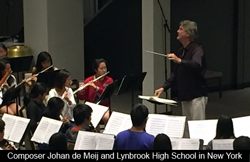 One of the most meaningful experiences you can give your students is a collaboration with a living composer. Seeing an ensemble pour themselves into a piece of music that has their name written on top of it is one of the many reasons I love what I do and one of the reasons so many composers are so passionate about working with educational ensembles. But what does that collaboration entail?
One of the most meaningful experiences you can give your students is a collaboration with a living composer. Seeing an ensemble pour themselves into a piece of music that has their name written on top of it is one of the many reasons I love what I do and one of the reasons so many composers are so passionate about working with educational ensembles. But what does that collaboration entail?
To begin with, it's important to note that composers have varying degrees of comfort with collaboration. Some composers prefer to let the needs of the music guide the commission, while some others don't mind (and even enjoy) requests as to orchestration, difficulty, length, and other parameters. For the purposes of this discussion, I will focus on the latter type of composer. That said, I don't pretend to speak for all composers, and you may have a very different style of collaboration from what I outline!
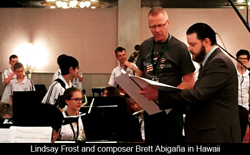 Before contacting a composer, you have to find one. The simplest thing is to just do some research. Talk to your colleagues, consult resources provided by professional organizations like CBDNA, NAfME, WASBE, ABA, etc., or simply do a quick Google search for composers in your area. You might also consult the faculty roster at your local university. Remember, composers are normal people, and we DO want to work with you! Most of the business I get as a composer comes via word of mouth, which is, in my opinion, the best way to get a gig. Finally, before contacting the composer, get to know their music so you know what you're getting. It would be quite frustrating to expect Arvo Pärt and instead, receive Karlheinz Stockhausen!
Before contacting a composer, you have to find one. The simplest thing is to just do some research. Talk to your colleagues, consult resources provided by professional organizations like CBDNA, NAfME, WASBE, ABA, etc., or simply do a quick Google search for composers in your area. You might also consult the faculty roster at your local university. Remember, composers are normal people, and we DO want to work with you! Most of the business I get as a composer comes via word of mouth, which is, in my opinion, the best way to get a gig. Finally, before contacting the composer, get to know their music so you know what you're getting. It would be quite frustrating to expect Arvo Pärt and instead, receive Karlheinz Stockhausen!
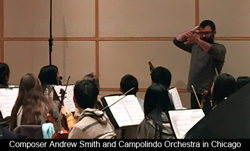 OK, so you've found a composer you want to work with: now what? Perhaps you’ve already done this but if not, it’s time to think about what you want! Do you want a 5-minute opener, or a 30-minute symphony? A grade 3 piece to use as a pedagogical tool, or a festival showpiece? Before formally contacting a composer, ask yourself what you want, but be prepared to take a collaborative approach. In the end, you'll have a better collaboration and a better piece if you work with the composer to determine the parameters of the commissioned work. Let's say you want a concert march for orchestra. It can be an easier sell to a composer to leave the specific parameters of that piece up for discussion. On the other hand, if you specifically want an 18-minute march that features the viola section, a bass trumpet, and a steam calliope, you may find it more difficult to hook that composer. Furthermore, it's in your best interest to determine some parameters for difficulty, or any specifics about orchestration. After all, you want a piece that highlights your ensemble’s strengths and capabilities!
OK, so you've found a composer you want to work with: now what? Perhaps you’ve already done this but if not, it’s time to think about what you want! Do you want a 5-minute opener, or a 30-minute symphony? A grade 3 piece to use as a pedagogical tool, or a festival showpiece? Before formally contacting a composer, ask yourself what you want, but be prepared to take a collaborative approach. In the end, you'll have a better collaboration and a better piece if you work with the composer to determine the parameters of the commissioned work. Let's say you want a concert march for orchestra. It can be an easier sell to a composer to leave the specific parameters of that piece up for discussion. On the other hand, if you specifically want an 18-minute march that features the viola section, a bass trumpet, and a steam calliope, you may find it more difficult to hook that composer. Furthermore, it's in your best interest to determine some parameters for difficulty, or any specifics about orchestration. After all, you want a piece that highlights your ensemble’s strengths and capabilities!
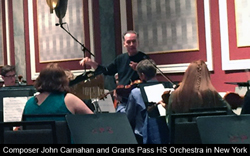 Another important factor to consider is time. As much as I wish it were different, inspiration rarely strikes spontaneously. More often than not, composition is an arduous process, however enjoyable it may be, and pieces go through several drafts before being sent to the conductor. You can do yourself and your composer a huge favor by giving them ample time to devote to their process. If that 18-minute march doesn't need to be delivered for 6 months to a year, the project will be more attractive than if you need it next Thursday. Of course, some composers are faster than others, and there's probably a composer out there that would love to write that piece for next week. But you should be aware that the deadline for a commission can often have a significant effect on whether a composer accepts a project, and how much it will cost you (commission fees will be covered in a future installment of Composers' Corner). In general, I would suggest contacting a composer about a year in advance of when you want the piece delivered.
Another important factor to consider is time. As much as I wish it were different, inspiration rarely strikes spontaneously. More often than not, composition is an arduous process, however enjoyable it may be, and pieces go through several drafts before being sent to the conductor. You can do yourself and your composer a huge favor by giving them ample time to devote to their process. If that 18-minute march doesn't need to be delivered for 6 months to a year, the project will be more attractive than if you need it next Thursday. Of course, some composers are faster than others, and there's probably a composer out there that would love to write that piece for next week. But you should be aware that the deadline for a commission can often have a significant effect on whether a composer accepts a project, and how much it will cost you (commission fees will be covered in a future installment of Composers' Corner). In general, I would suggest contacting a composer about a year in advance of when you want the piece delivered.
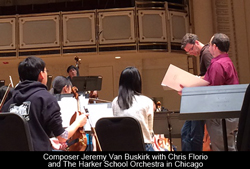 Finally, a collaboration with a composer can be even more meaningful if it commemorates or memorializes an event, person, or place. Since the primary goal of every composer is to communicate with and touch an audience through their music, these are some of the most personally rewarding collaborations we can have. You can see examples of this kind of personalized collaboration in pieces like Andrew Smith's Black Sand (written about Hawaii, where the piece was premiered), Vince Oliver's Song for Maya (written for and about the commissioning conductor's daughter), and my Lux Contrapunctum (which musically spells out the names of individual students in the ensemble, and provides a narrative based on the name of their school).
Finally, a collaboration with a composer can be even more meaningful if it commemorates or memorializes an event, person, or place. Since the primary goal of every composer is to communicate with and touch an audience through their music, these are some of the most personally rewarding collaborations we can have. You can see examples of this kind of personalized collaboration in pieces like Andrew Smith's Black Sand (written about Hawaii, where the piece was premiered), Vince Oliver's Song for Maya (written for and about the commissioning conductor's daughter), and my Lux Contrapunctum (which musically spells out the names of individual students in the ensemble, and provides a narrative based on the name of their school).
The process of collaborating with a living composer can be a fantastically rewarding experience for both you and the composer with whom you work. But the real beneficiaries are your students, who have a vested interest in a piece written for or even about them, and your audience, who gets to hear a new piece of music for the very first time. Have you had a particularly fruitful collaboration with a composer? If so, we want to hear from you! You can email me at [email protected], and some of your comments may be included in a future installment of Composers' Corner!
Stay tuned next month for an interview with composer, conductor, and educator Johan de Meij!
 One of the most meaningful experiences you can give your students is a collaboration with a living composer. Seeing an ensemble pour themselves into a piece of music that has their name written on top of it is one of the many reasons I love what I do and one of the reasons so many composers are so passionate about working with educational ensembles. But what does that collaboration entail?
One of the most meaningful experiences you can give your students is a collaboration with a living composer. Seeing an ensemble pour themselves into a piece of music that has their name written on top of it is one of the many reasons I love what I do and one of the reasons so many composers are so passionate about working with educational ensembles. But what does that collaboration entail?




 Another important factor to consider is time. As much as I wish it were different, inspiration rarely strikes spontaneously. More often than not, composition is an arduous process, however enjoyable it may be, and pieces go through several drafts before being sent to the conductor. You can do yourself and your composer a huge favor by giving them ample time to devote to their process. If that 18-minute march doesn't need to be delivered for 6 months to a year, the project will be more attractive than if you need it next Thursday. Of course, some composers are faster than others, and there's probably a composer out there that would love to write that piece for next week. But you should be aware that the deadline for a commission can often have a significant effect on whether a composer accepts a project, and how much it will cost you (commission fees will be covered in a future installment of Composers' Corner). In general, I would suggest contacting a composer about a year in advance of when you want the piece delivered.
Another important factor to consider is time. As much as I wish it were different, inspiration rarely strikes spontaneously. More often than not, composition is an arduous process, however enjoyable it may be, and pieces go through several drafts before being sent to the conductor. You can do yourself and your composer a huge favor by giving them ample time to devote to their process. If that 18-minute march doesn't need to be delivered for 6 months to a year, the project will be more attractive than if you need it next Thursday. Of course, some composers are faster than others, and there's probably a composer out there that would love to write that piece for next week. But you should be aware that the deadline for a commission can often have a significant effect on whether a composer accepts a project, and how much it will cost you (commission fees will be covered in a future installment of Composers' Corner). In general, I would suggest contacting a composer about a year in advance of when you want the piece delivered. Finally, a collaboration with a composer can be even more meaningful if it commemorates or memorializes an event, person, or place. Since the primary goal of every composer is to communicate with and touch an audience through their music, these are some of the most personally rewarding collaborations we can have. You can see examples of this kind of personalized collaboration in pieces like Andrew Smith's Black Sand (written about Hawaii, where the piece was premiered), Vince Oliver's Song for Maya (written for and about the commissioning conductor's daughter), and my Lux Contrapunctum (which musically spells out the names of individual students in the ensemble, and provides a narrative based on the name of their school).
Finally, a collaboration with a composer can be even more meaningful if it commemorates or memorializes an event, person, or place. Since the primary goal of every composer is to communicate with and touch an audience through their music, these are some of the most personally rewarding collaborations we can have. You can see examples of this kind of personalized collaboration in pieces like Andrew Smith's Black Sand (written about Hawaii, where the piece was premiered), Vince Oliver's Song for Maya (written for and about the commissioning conductor's daughter), and my Lux Contrapunctum (which musically spells out the names of individual students in the ensemble, and provides a narrative based on the name of their school).